Sir John Monash, Personal Files Book 5, 16 May - 25 May 1915, Part 10
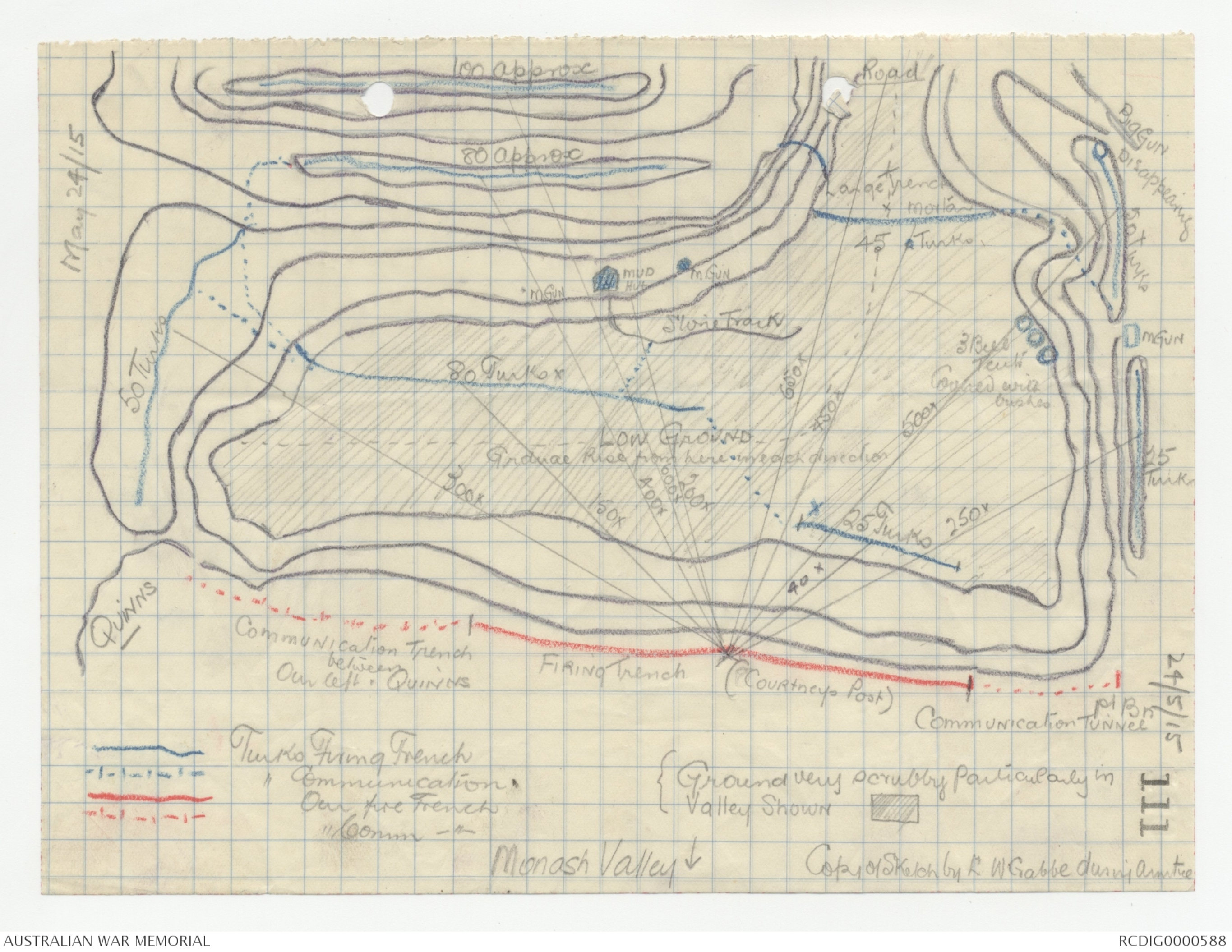
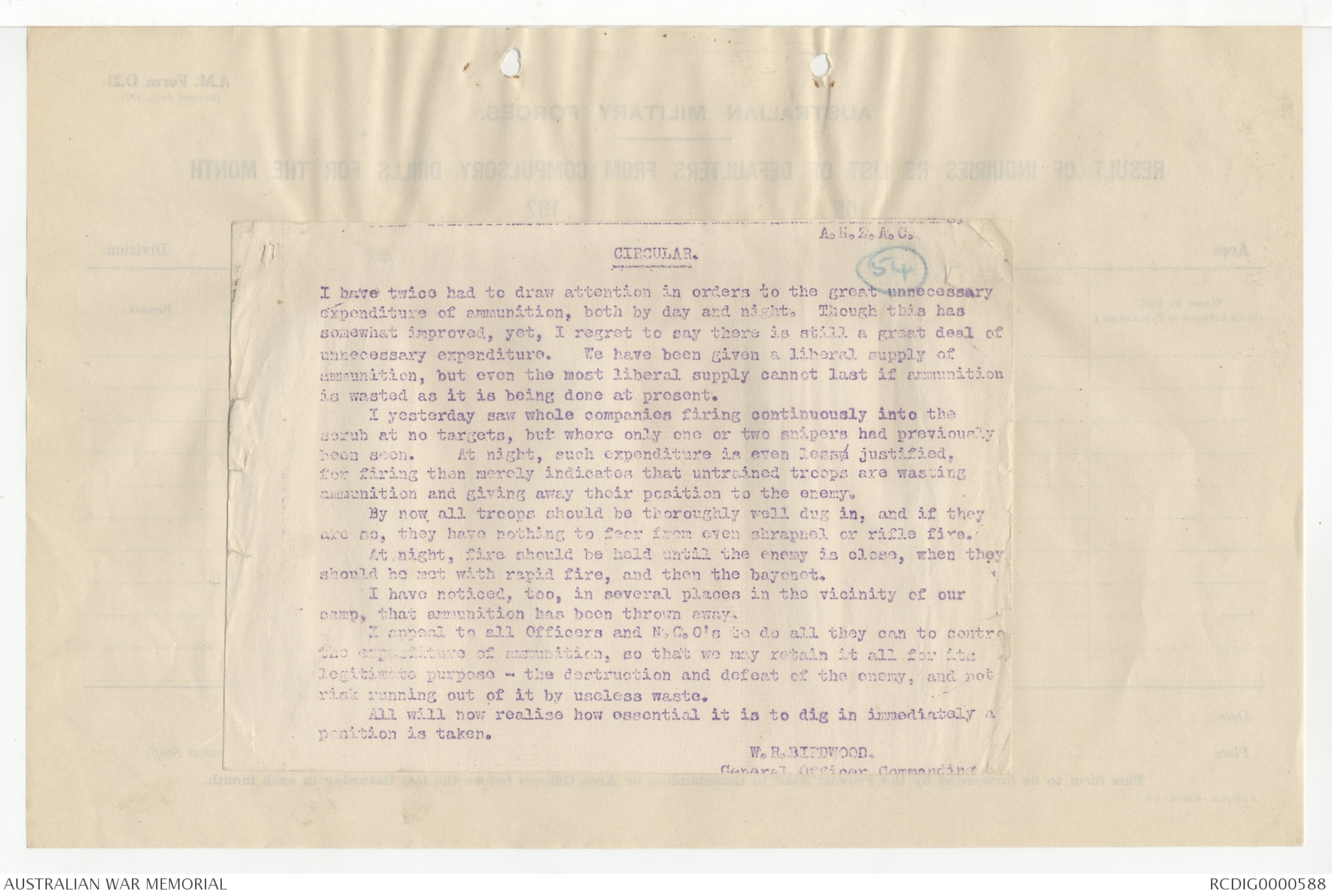
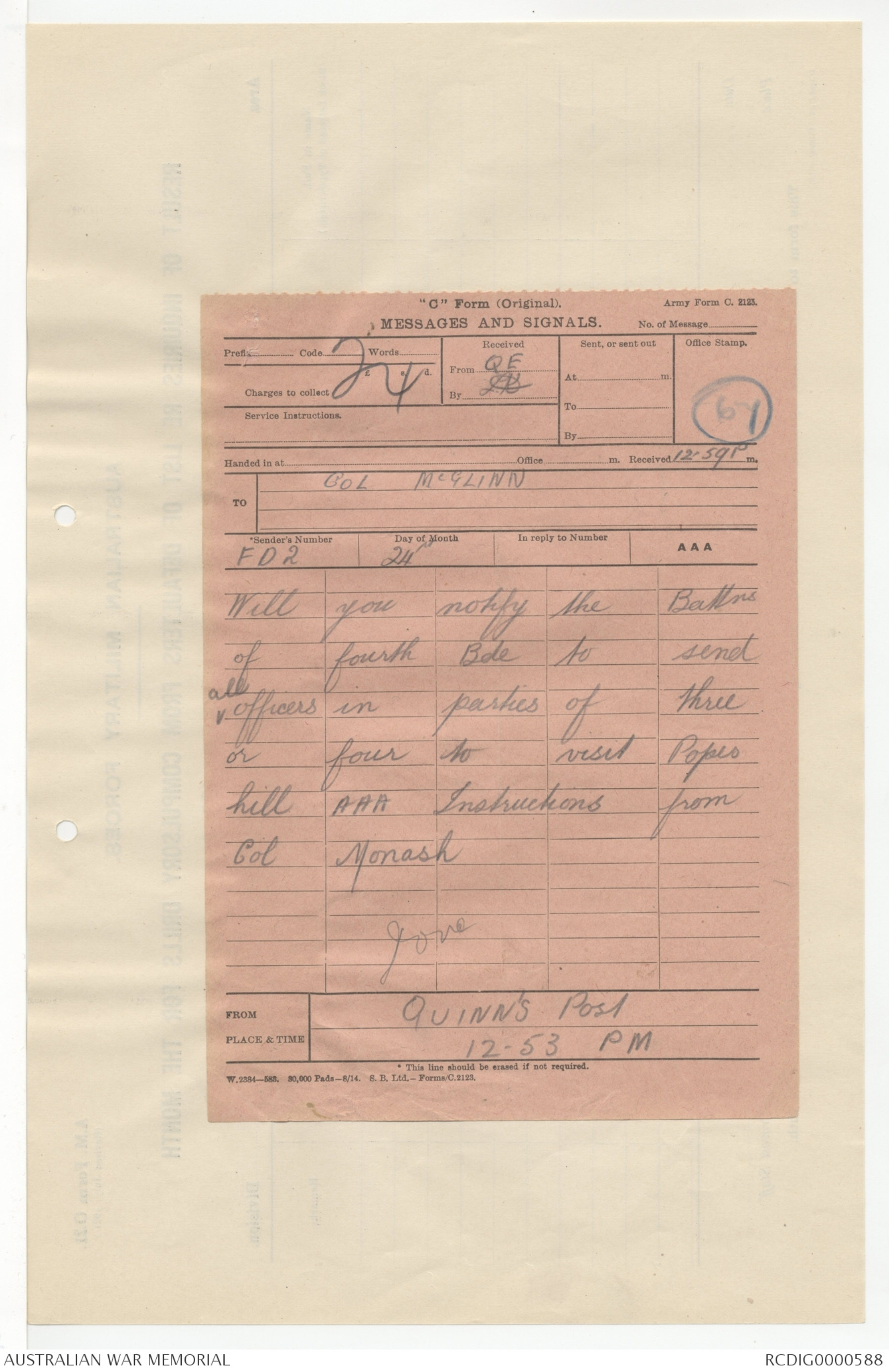
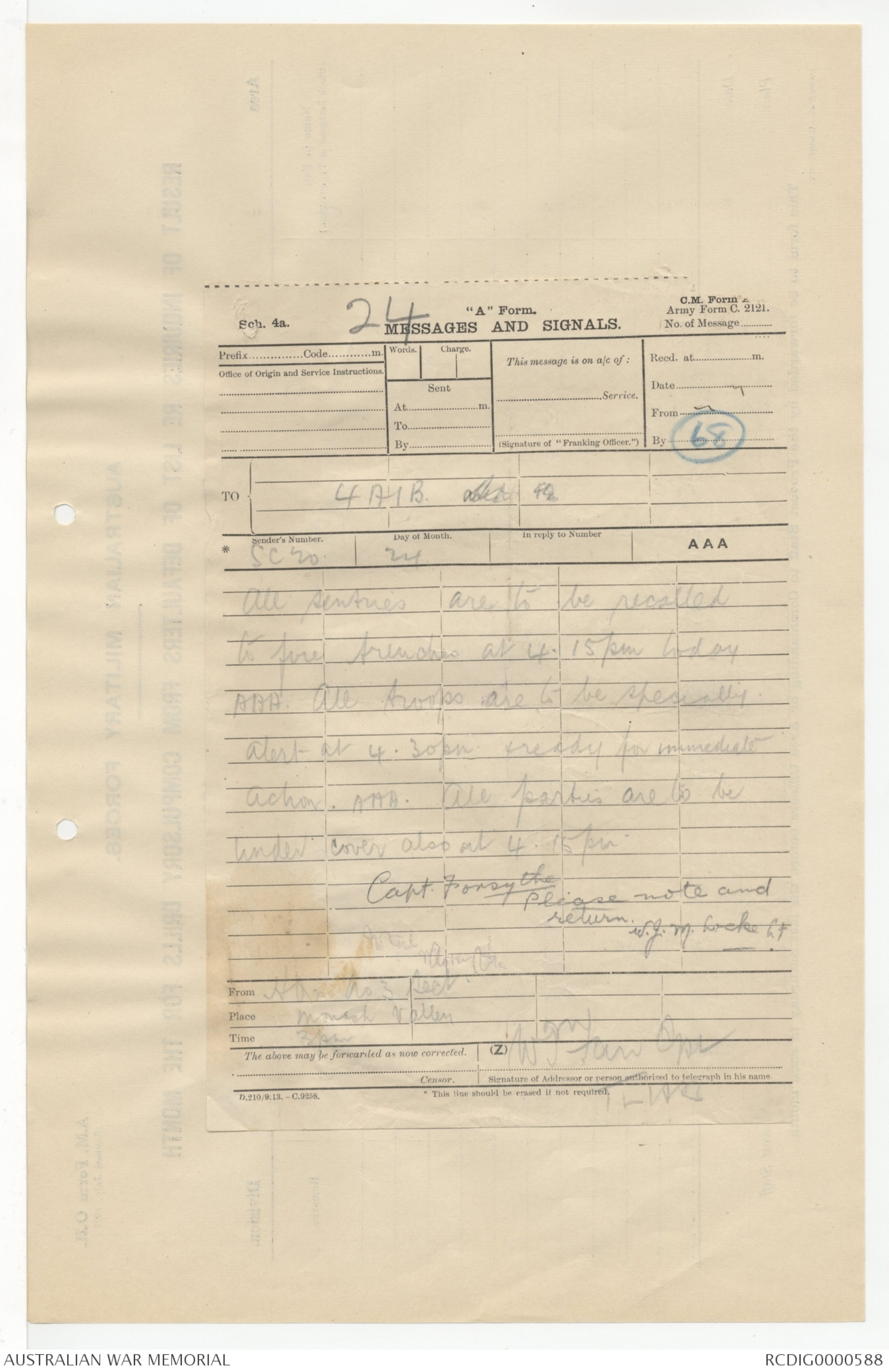
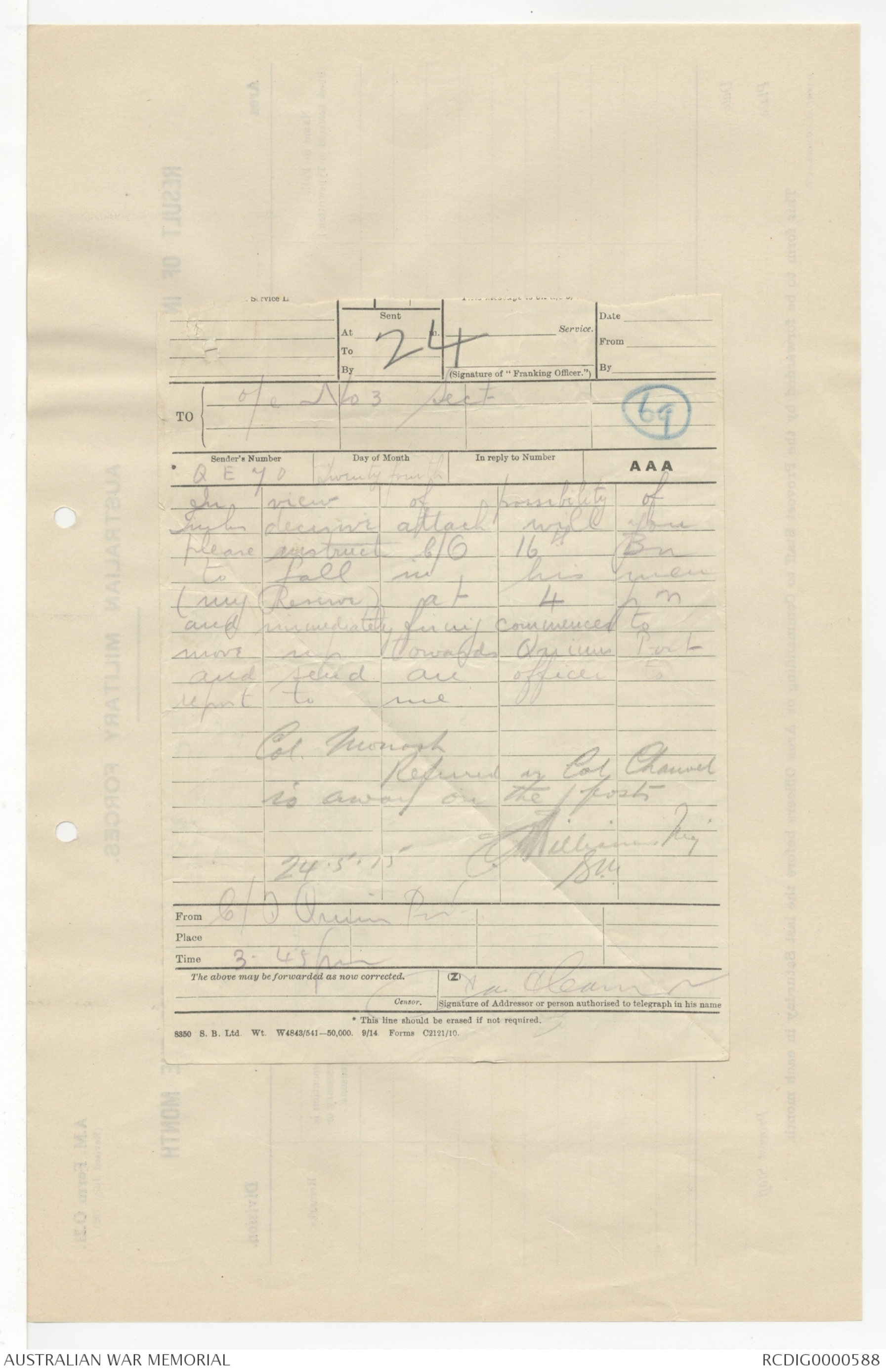
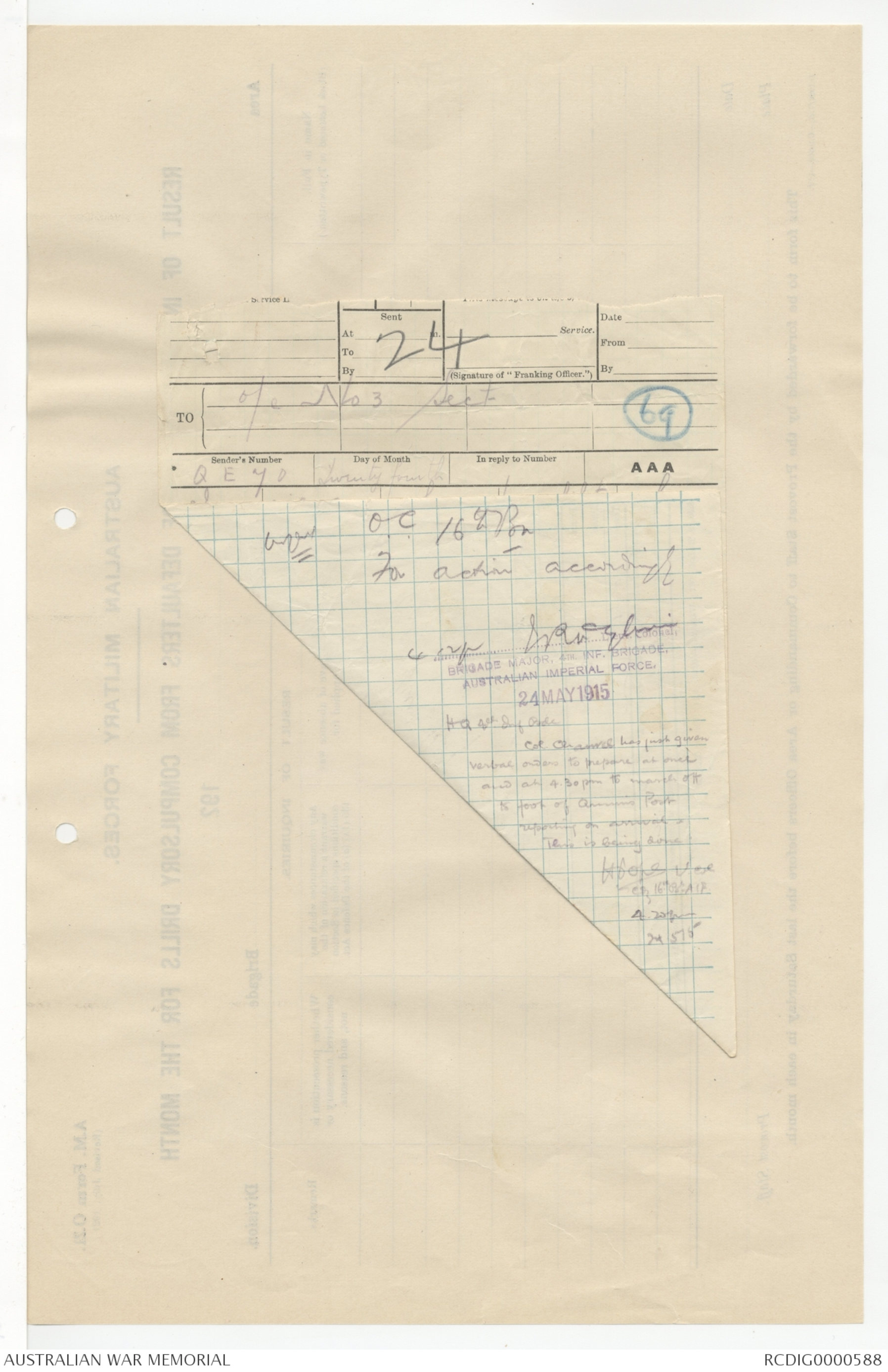
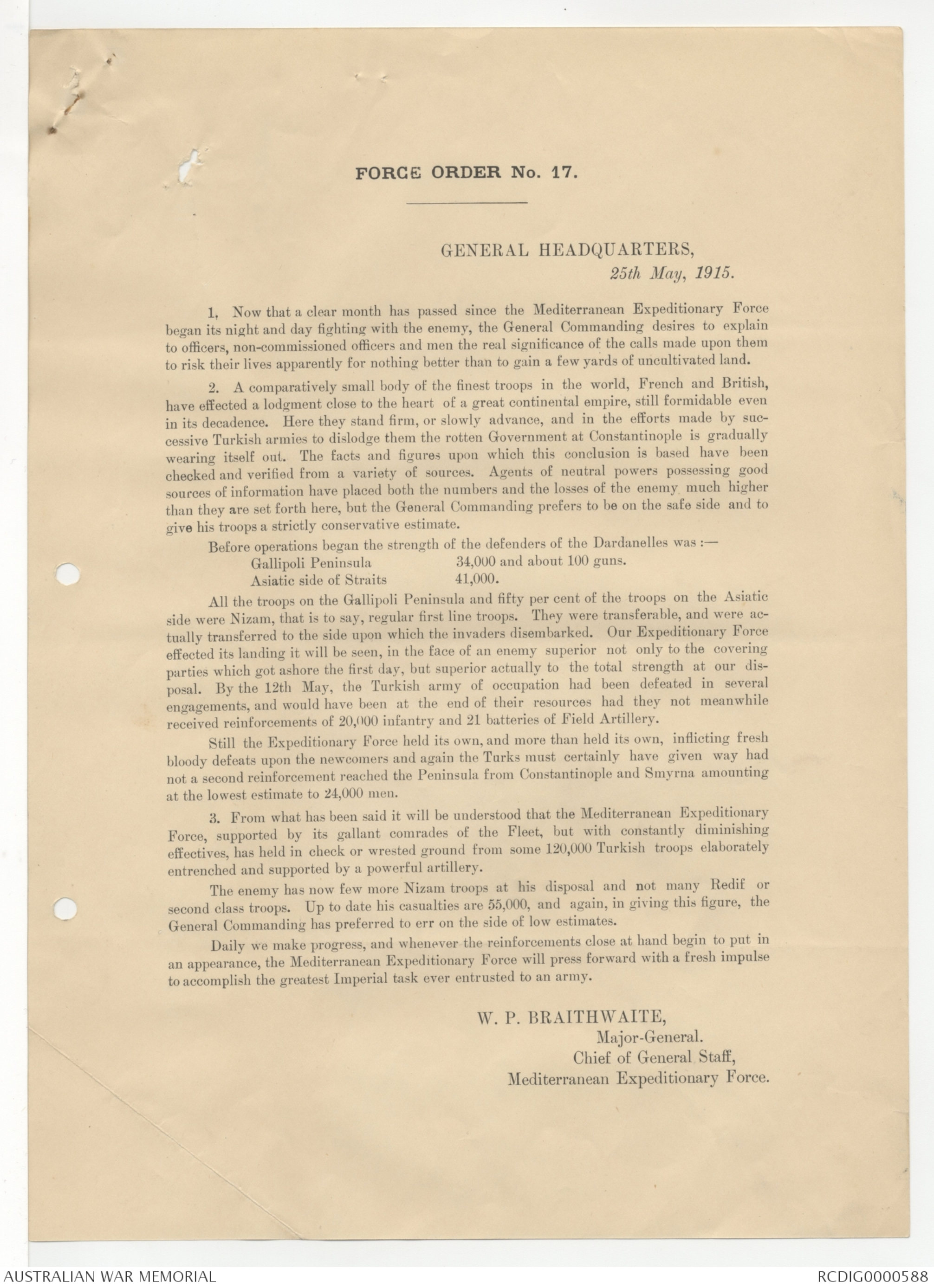
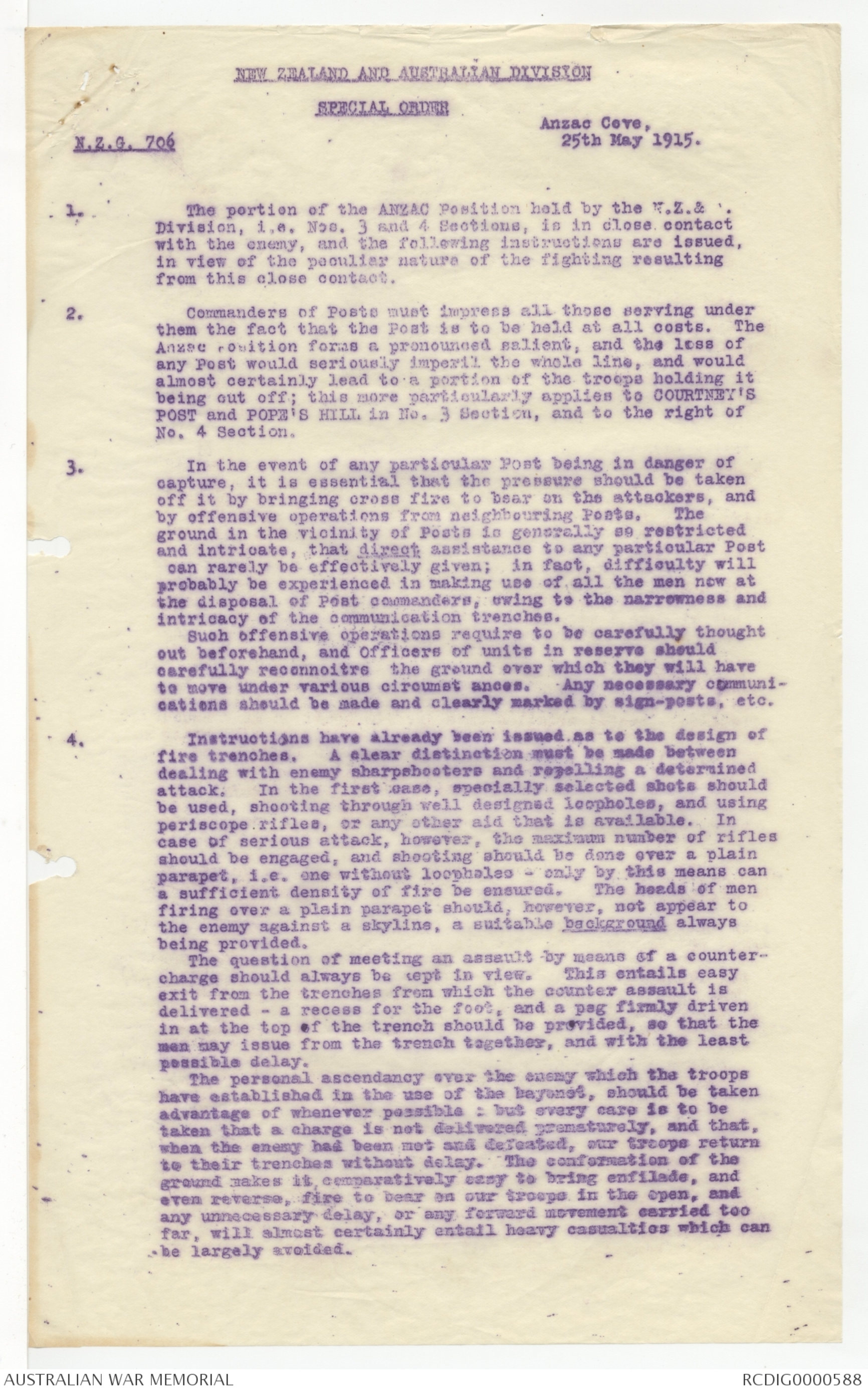
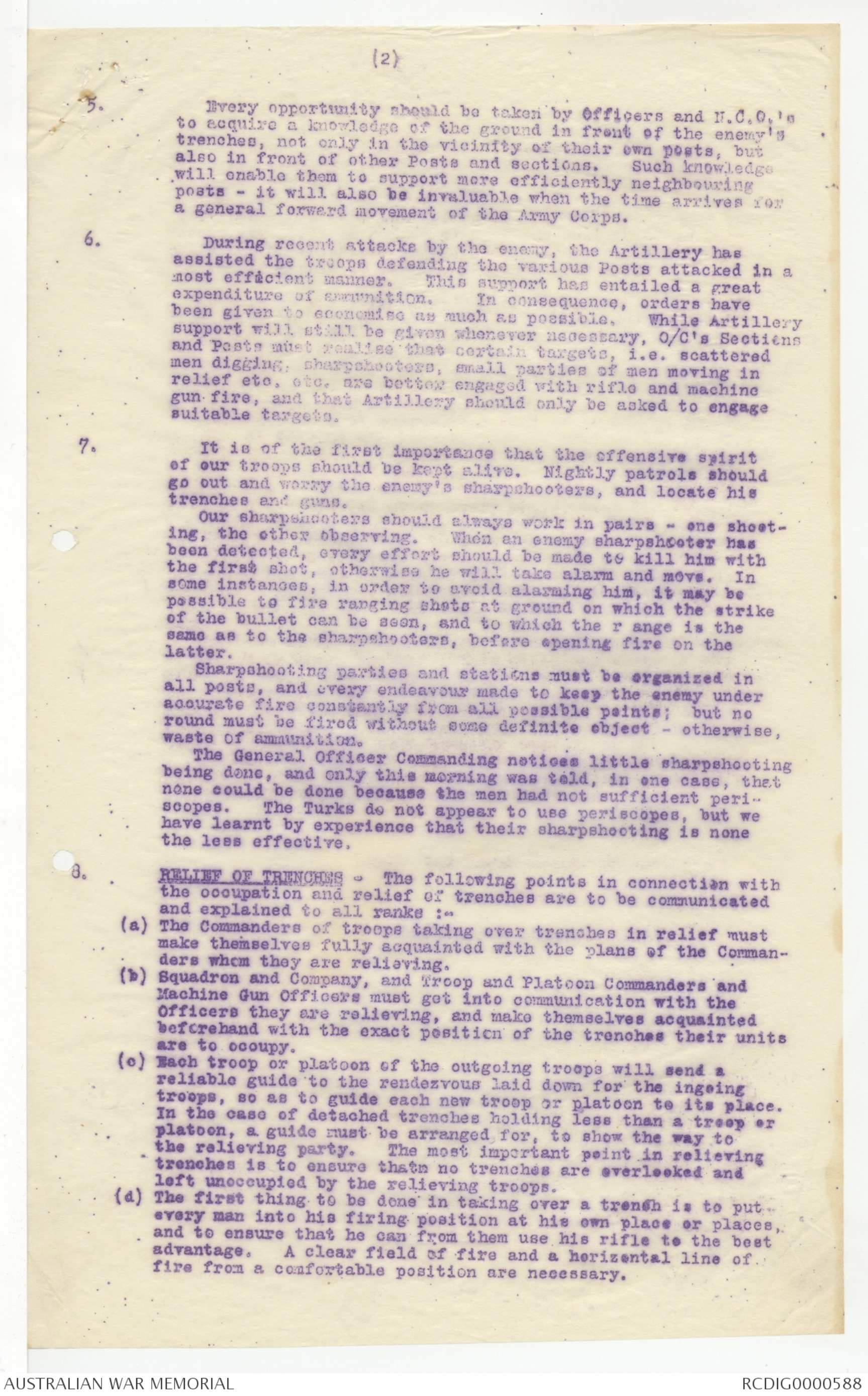
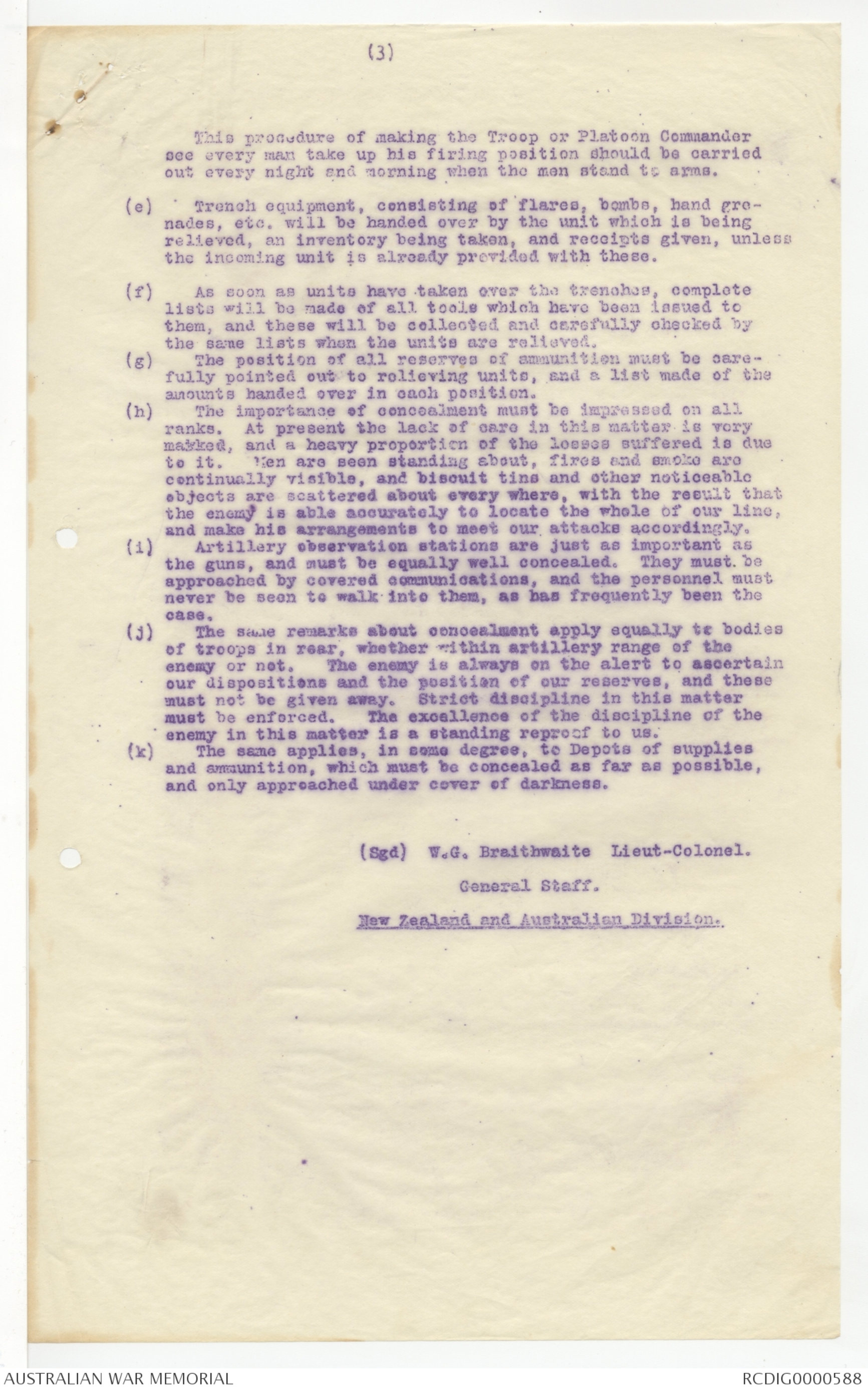
Page 1 is a diagram of Turkish trenches from Courtneys post
Outlines numbers of Turks in trenches, topography, Machine gun position of Turks.
Also notes trenches of Courtney and Quinn
May 24/15
Copy of sketch by R W Gabble during Armistice
111
A.N.Z.A.C.
CIRCULAR.
[*54*]
I have twice had to draw attention in orders to the great unnecessary
expenditure of ammunition, both by day and night. Though this has
somewhat improved, yet, I regret to say there is still a great deal of
unnecessary expenditure. We have been given a liberal supply of
ammunition, but even the most liberal supply cannot last if ammunition
is wasted as it is being done at present.
I yesterday saw whole companies firing continuously into the
scrub at no targets, but where only one or two snipers had previously
been seen. At night, such expenditure is even less justified,
for firing then merely indicates that untrained troops are wasting
ammunition and giving away their position to the enemy.
By now all troops should be thoroughly well dug in, and if they
are so, they have nothing to fear from even shrapnel or rifle fire.
At night, fire should be held until the enemy is close, when they
should he met with rapid fire, and then the bayonet.
I have noticed, too, in several places in the vicinity of our
camp, that ammunition has been thrown away.
I appeal to all Officers and N.C.O's to do all they can to control
the expenditure of ammunition, so that we may retain it all for its
legitimate purpose - the destruction and defeat of the enemy, and not
risk running out of it by useless waste.
All will now realise how essential it is to dig in immediately
a position is taken.
W.R. BIRDWOOD.
General Officer Commanding
Received from QE
By LR
24
(67)
Received here at 12.59 PM.
TO COL McGLINN
* Senders Number. Day of Month.
FD 2 24th
Will you notify the Battalions
of fourth Bde to send
^all officers in parties of three
or four to visit Popes
Hill AAA Instructions from
Col Monash
Done
From QUINNS Post
PLACE & TIME 12:53 PM
24
(68)
TO 4th AIB (initial)
* Senders Number. Day of Month.
SC 20 24
All sentries are to be recalled
to fire trench at 4.15 pm today
AAA All troops are to be specially
alert at 4.30pm today for immediate
action. AAA . All parties are to be
under cover also at 4.15pm
Capt Forsythe
Please note and return
W.J.M Locke LT
Attn RMc
From H Q No 3 Section
Place Monash Valley
Time 3pm
W J Farr Cpl
TLWRS
24
TO O/C No 3 Sect (69)
* Senders Number. Day of Month. I
Q E 70 Twenty fourth
In view of possibility of
Turks decisive attack will you
please instruct C/O 16th Bn
to call in his men
(my reserve) at 4 pm
and immediately firing commenced to
move up towards Quinns Post
and send all officers to
report to me
Col Monash
Referred as Col Chauvel
is away on the posts
24.5.15 C W Williams Brg
SM.
From C/O Quinns Post
Time 3.45 pm
JF Cannan
24
TO O/C No 3 Sect (69)
* Senders Number. Day of Month.
Q E 70 Twenty fourth
urgent OC 16th BN
For action accordingly
4.12pm R McGlinn
BRIGADE MAJOR 4TH INF BRIGADE
AUSTRALIAN IMPERIAL FORCE
24 May 1915
HQ 4th Inf Bde
Col Chauvel has just given
verbal orders to prepare at once
and at 4.30 pm to march off
to foot of Quinns Post
reporting on arrival
This is being done
H Pope S Vese
CO 16th Bn AIF
4.20pm
24 5 15
FORCE ORDER No. 17.
GENERAL HEADQUARTERS,
25th May, 1915.
1. Now that a clear month has passed since the Mediterranean Expeditionary Force
began its night and day fighting with the enemy, the General Commanding desires to explain
to officers, non-commissioned officers and men the real significance of the calls made upon them to risk their lives apparently for nothing better than to gain a few yards of uncultivated land.
2. A comparatively small body of the finest troops in the world, French and British,
have effected a lodgment close to the heart of a great continental empire, still formidable even
in its decadence. Here they stand firm, or slowly advance, and in the efforts made by successive Turkish armies to dislodge them the rotten Government at Constantinople is gradually
wearing itself out. The facts and figures upon which this conclusion is based have been
checked and verified from a variety of sources. Agents of neutral powers possessing good
sources of information have placed both the numbers and the losses of the enemy much higher
than they are set forth here, but the General Commanding prefers to be on the safe side and to
give his troops a strictly conservative estimate.
Before operations began the strength of the defenders of the Dardanelles was :—
Gallipoli Peninsula 34,000 and about 100 guns.
Asiatic side of Straits 41,000.
All the troops on the Gallipoli Peninsula and fifty per cent of the troops on the Asiatic
side were Nizam, that is to say, regular first line troops. They were transferable, and were actually transferred to the side upon which the invaders disembarked. Our Expeditionary Force
effected its landing it will be seen, in the face of an enemy superior not only to the covering
parties which got ashore the first day, but superior actually to the total strength at our disposal.
By the 12th May, the Turkish army of occupation had been defeated in several
engagements, and would have been at the end of their resources had they not meanwhile
received reinforcements of 20,000 infantry and 21 batteries of Field Artillery.
Still the Expeditionary Force held its own, and more than held its own, inflicting fresh
bloody defeats upon the newcomers and again the Turks must certainly have given way had
not a second reinforcement reached the Peninsula from Constantinople and Smyrna amounting
at the lowest estimate to 24,000 men.
3. From what has been said it will be understood that the Mediterranean Expeditionary
Force, supported by its gallant comrades of the Fleet, but with constantly diminishing
effectives, has held in check or wrested ground from some 120,000 Turkish troops elaborately entrenched and supported by a powerful artillery.
The enemy has now few more Nizam troops at his disposal and not many Redif or
second class troops. Up to date his casualties are 55,000, and again, in giving this figure, the
General Commanding has preferred to err on the side of low estimates.
Daily we make progress, and whenever the reinforcements close at hand begin to put in
an appearance, the Mediterranean Expeditionary Force will press forward with a fresh impulse
to accomplish the greatest Imperial task ever entrusted to an army.
W. P. BRAITHWAITE,
Major-General.
Chief of General Staff,
Mediterranean Expeditionary Force.
NEW ZEALAND AND AUSTRALIAN DIVISION
SPECIAL ORDER
N.Z.G. 706 Anzac Cove,
25th May 1915.
1. The portion of the ANZAC Position held by the N.Z. & [[A?]].
Division, i.e. Nos. 3 and 4 Sections, is in close contact
with the enemy, and the following instructions are issued,
in view of the peculiar nature of the fighting resulting
from this close contact.
2. Commanders of Posts must impress all those serving under
them the fact that the Post is to be held at all costs. The
Anzac position forms a pronounced salient, and the loss of
any Post would seriously imperil the whole line, and would
almost certainly lead to a portion of the troops holding it
being out off; this more particularly applies to COURTNEY'S
POST and POPE'S HILL in No. 3 Section, and to the right of
No. 4 Section.
3. In the event of any particular Post being in danger of
capture, it is essential that the pressure should be taken
off it by bringing cross fire to bear on the attackers, and
by offensive operations from neighbouring Posts. The
ground in the vicinity of Posts is generally so restricted
and intricate, that direct assistance to any particular Post
can rarely be effectively given; in fact, difficulty will
probably be experienced in making use of all the men now at
the disposal of Post commanders, owing to the narrowness and
intricacy of the communication trenches.
Such offensive operations require to be carefully thought
out beforehand, and Officers of units in reserve should
carefully reconnoitre the ground over which they will have
to move under various circumst ances. Any necessary communications
should be made and clearly marked by sign-posts, etc.
4. Instructions have already been issued as to the design of
fire trenches. A clear distinction must be made between
dealing with enemy sharpshooters and repelling a determined
attack. In the first case, specially selected shots should
be used, shooting through well designed loopholes, and using
periscope rifles, or any other aid that is available. In
case of serious attack, however, the maximum number of rifles
should be engaged, and shooting should be done over a plain
parapet, i.e. one without loopholes - only by this means can
a sufficient density of fire be ensured. The heads of men
firing ever a plain parapet should, however, not appear to
the enemy against a skyline, a suitable background always
being provided.
The question of meeting an assault by means of a counter-
charge should always be kept in view. This entails easy
exit from the trenches from which the counter assault is
delivered - a recess for the foot, and a peg firmly driven
in at the top of the trench should be provided, so that the
men may issue from the trench together, and with the least
possible delay.
The personal ascendancy ever the enemy which the troops
have established in the use of the bayonet, should be taken
advantage of whenever possible : but every care is to be
taken that a charge is not delivered prematurely, and that,
when the enemy had been met and defeated, our troops return
to their trenches without delay. The conformation of the
ground makes it, comparatively easy to bring enfilade, and
even reverse, fire to bear on our troops in the open, and
any unnecessary delay, or any forward movement carried too
far, will almost certainly entail heavy casualties which can
be largely avoided.
(2)
5. Every opportunity should be taken by Officers and N.C.O.'s
to acquire a knowledge of the ground in front of the enemy’s
trenches, not only in the vicinity of their own posts, but
also in front of other Posts and sections. Such knowledge
will enable them to support more efficiently neighbouring
posts - it will also be invaluable when the time arrives for
a general forward movement of the Army Corps.
6. During recent attacks by the enemy, the Artillery has
assisted the troops defending the various Posts attacked in a
most efficient manner. This support has entailed a great
expenditure of ammunition. In consequence, orders have
been given to economise as much as possible. While Artillery
support will still be given whenever necessary, O/C's Sections
and Posts must realise that certain targets, i.e. scattered
men digging, sharpshooters, small parties of men moving in
relief etc. etc. are better engaged with rifle and machine
gun fire, and that Artillery should only be asked to engage
suitable targets.
7. It is of the first importance that the offensive spirit
of our troops should be kept alive. Nightly patrols should
go out and worry the enemy's sharpshooters, and locate his
trenches and guns.
Our sharpshooters should always work in pairs - one shooting,
the other observing. When an enemy sharpshooter has
been detected, every effort should be made to kill him with
the first shot, otherwise he will take alarm and move. In
some instances, in order to avoid alarming him, it may be
possible to fire ranging shots at ground on which the strike
of the bullet can be seen, and to which the r ange is the
same as to the sharpshooters, before opening fire on the
latter.
Sharpshooting parties and stations must be organized in
all posts, and every endeavour made to keep the enemy under
accurate fire constantly from all possible points; but no
round must be fired without some definite object - otherwise,
waste of ammunition.
The General Officer Commanding notices little sharpshooting
being done, and only this morning was told, in one case, that
none could be done because the men had not sufficient periscopes.
The Turks do not appear to use periscopes, but we
have learnt by experience that their sharpshooting is none
the less effective.
8. RELIEF OF TRENCHES - The following points in connection with the occupation and relief of trenches are to be communicated
and explained to all ranks :-
(a) The Commanders of troops taking over trenches in relief must
make themselves fully acquainted with the plans of the Commanders
whom they are relieving.
(b) Squadron and Company, and Troop and Platoon Commanders and
Machine Gun Officers must get into communication with the
officers they are relieving, and make themselves acquainted
beforehand with the exact position of the trenches their units
are to occupy.
(c) Each troop or platoon of the outgoing troops will send a
reliable guide to the rendezvous laid down for the ingoing
troops, so as to guide each new troop or platoon to its place.
In the case of detached trenches holding less than a troop or
platoon, a guide must be arranged for, to show the way to
the relieving party. The most important point in relieving
trenches is to ensure that no trenches are overlooked and
1eft unoccupied by the relieving troops.
(d) The first thing to be done in taking ever a trench is to put
every man into his firing position at his own place or places,
and to ensure that he can from them use his rifle to the best
advantage. A clear field of fire and a horizontal line of.
fire from a comfortable position are necessary.
(3)
This procedure of making the Troop or Platoon Commander
see every man take up his firing position should be carried
out every night and morning when the men stand to arms.
(e) Trench equipment, consisting of flares, bombs, hand grenades,
etc. will be handed over by the unit which is being
relieved, an inventory being taken, and receipts given, unless
the incoming unit is already provided with these.
(f) As soon as units have taken over the trenches complete
lists will be made of all tools which have been issued to
them, and these will be collected and carefully checked by
the same lists when the units are relieved.
(g) The position of all reserves of ammunition must be carefully
pointed out to relieving units, and a list made of the
amounts handed over in each position.
(h) The importance of concealment must be impressed on all
ranks. At present the lack of care in this matter is very
marked, and a heavy proportion of the losses suffered is due
to it. Men are seen standing about, fires and smoke are
continually visible, and biscuit tins and other noticeable
objects are scattered about every where, with the result that
the enemy is able accurately to locate the whole of our line,
and make his arrangements to meet our attacks accordingly.
(i) Artillery observation stations are just as important as
the guns, and must be equally well concealed. They must. be
approached by covered communications, and the personnel must
never be seen to walk into them, as has frequently been the
case.
(j) The same remarks about concealment apply equally to bodies of troops in rear, whether within artillery range of the
enemy or not. The enemy is always on the alert to ascertain
our dispositions and the position of our reserves, and these
must not be given away. Strict discipline in this matter
must be enforced. The excellence of the discipline of the
enemy in this matter is a standing reproof to us.
(k) The same applies, in some degree, to Depots of supplies
and ammunition, which must be concealed as far as possible,
and only approached under cover of darkness.
(Sgd) W.G. Braithwaite Lieut-Colonel.
General Staff.
New Zealand and Australian Division.
 Deb Parkinson
Deb ParkinsonThis transcription item is now locked to you for editing. To release the lock either Save your changes or Cancel.
This lock will be automatically released after 60 minutes of inactivity.